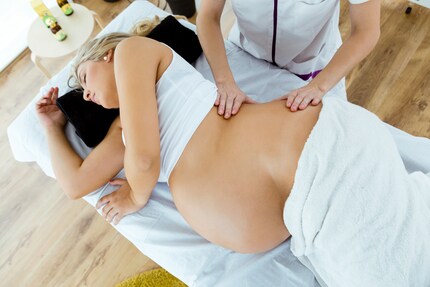
Guide
Yoga during your period: SOS help for period pain
by Ronja Magdziak

Sex promotes labour! Didn't you know? In addition to exercise, a full bath, supplements in drinks or food, sex can positively support you during labour.
Day X is here and you're still waiting for the birth? Do you feel like a pregnant mountain duck by now and want your baby to finally see the light of day? Are you wondering whether the baby is still alive, is getting enough oxygen and has enough space?
There are a few tricks you can use to stimulate labour. I have summarised eight of them for you. However, it is important that you and your baby are healthy and fit. Both of you must be ready for labour. This means that the baby must be in the right position, your cervix should be soft and your uterus should be dilated. Normally, this is the case in the 40th week of pregnancy. Ask your doctor or midwife for more detailed advice.
1. sex
Yes, it really is! When the uterus is ready, sexual intercourse can have a stimulating effect on labour. The labour hormone oxytocin is produced during sexual arousal. In addition, sperm with its tissue hormones ensures a soft cervix and helps the cervix to lengthen. The woman's orgasm causes the uterus to contract and labour can be triggered accordingly. With this in mind: have fun!
2. movement
If you have not been confined to bed by the doctor, a long walk in the fresh air or climbing stairs can get your circulation going. It promotes sleep, digestion and helps the baby to sink into the pelvis. This creates excessive pressure on the cervix. Alternatively, sports such as swimming, yoga or Pilates can be used. Cleaning windows, circling around with an exercise ball and belly dancing are also said to stimulate labour. In any case, listen to your body and don't push yourself too hard so that you have enough energy reserves for the birth.

3rd full bath
Soak yourself in a warm bath. Eucalyptus oil, ginger, cloves or cinnamon as an additive have a relaxing effect and can induce labour. Pay attention to your circulation and the signs of your body. This is because the warm water can cause circulatory problems or the desired effect may occur sooner than expected. For this reason, do not bathe if there is no-one nearby that you can call.
4. food
Cinnamon, cloves and ginger, along with many other spices such as mint, nutmeg, cardamom, oregano, basil and thyme, can have a positive effect on labour. But spicy food, bananas or fresh pineapple are also said to provide a certain stimulus. The motto "If it doesn't help, it doesn't hurt" is probably more important.
5th drink
In addition to specific labour-promoting teas, drinks containing quinine (bitter lemon or tonic water) or caffeine (coffee, cola, black tea) are also beneficial in promoting labour. There is also the option of a labour cocktail with castor oil. This cocktail contains alcohol in some cases and promotes labour in an extreme way. For this reason, it should only be used in consultation with a doctor or midwife. The body and the baby must be ready for labour. Otherwise complications may arise during labour. It is possible that the resulting stress can lead to a lack of oxygen in the baby. A lack of fluids, nausea and intestinal cramps are known side effects of this cocktail for you as a mother. And we all know that the alcohol it contains is not exactly good for a baby either. Avoid this cocktail if possible.

6. Alternative methods
For one woman, a gentle abdominal or reflexology massage can help, for another homeopathy, acupuncture, acupressure, osteopathy or nipple stimulation. It is important to find the right treatment for your own body. Your midwife can usually give you very good advice on this.
7. recovery
The body releases labour-promoting hormones, especially during periods of rest. This is one reason why many women experience pre-labour contractions at night. By getting enough sleep and plenty of rest, you can help your body and positively support labour.
8. Regular bowel movements
If you eat a balanced diet in the last few weeks of pregnancy and eat easily digestible foods, this will promote labour. This means that your body has to worry less about digestion and has more energy for labour. You can also support elimination with a tablespoon of ground linseed per day with plenty of water.
All women's bodies are different, so not all eight tricks will work for every woman. This may sound vague to you, but it is the reality. However, apart from the labour cocktail, all variations are basically harmless. Your doctor or midwife will be happy to advise you on this. They know you, your baby and your body best and know which form of labour support makes sense. Or you can leave everything as it is and trust nature completely. She knows when your baby is ready to see the world and will help you to master this situation.
I’m the cook, cleaner, police officer, nurse, entertainer, motivator, author, storyteller, coach, organiser, chauffeur, lawyer and judge. To put it simply, I’m a mum to a daughter and not just a (Content) Manager at the office but also at home.
Practical solutions for everyday problems with technology, household hacks and much more.
Show all